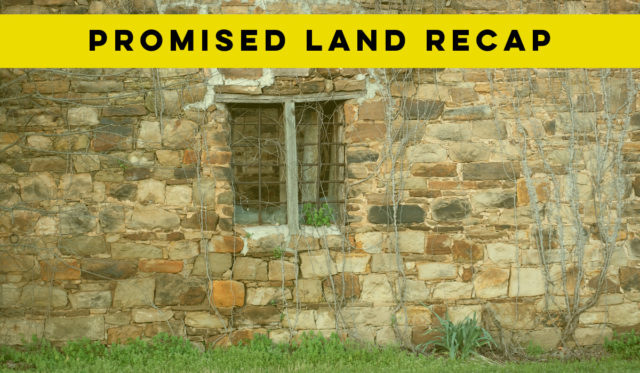

As with most complex civil issues, many people will readily admit that they have not been keeping up with the cascade of news about the affirmed Indian Country reservations in eastern Oklahoma.
This post is a part of the Oklahoma Media Center’s Promised Land effort, which shows how the landmark McGirt v. Oklahoma decision will affect both tribal and non-Indigenous residents in the state.
To be sure, many tribal citizens, state leaders, law enforcement officers, prosecutors, defense attorneys, other lawyers and victim advocacy groups are particularly focused on the topic.
But many Oklahomans — and otherwise informed national news consumers — will admit that they are not up to speed.
If that’s you, the following excerpts of articles can serve as entry points for you to familiarize yourself with the reservation topic. Local media have been sharing their coverage with each other’s audiences through the Oklahoma Media Center’s “Promised Land” reporting project.
Beyond these articles, we also encourage you to bookmark NonDoc’s own Promised Land reporting page, as well as our ongoing coverage of key tribal elections.
The excerpts below features the first few paragraphs of pieces published between July 15 and the end of the month. In some instances the excerpts have been edited lightly for timeliness and clarity.
Victim in McGirt case ‘plunged back into black hole,’ federal prosecutors say
By Chris Casteel
The Oklahoman
July 26, 2021
In the past year, the name McGirt has become widely used shorthand for the U.S. Supreme Court decision on criminal jurisdiction in Indian country in Oklahoma.
The name evokes varying responses depending on a person’s view of the decision, which has led to most of eastern Oklahoma being affirmed as Indian reservations.
For one woman, the name evokes the horrors of being sexually abused as a four-year-old in 1996. Now, according to federal prosecutors, “every time B.B. sees, reads, or hears any type of ‘McGirt’ coverage, she is taken right back to the feelings she had as a helpless victim being perpetrated on by her step-grandfather some 25 years ago.”
Before “McGirt” was a court decision with momentous implications for the state of Oklahoma, Jimcy McGirt was a convicted child rapist. He was serving two 500-year sentences and a life sentence for what he did to the girl in Wagoner County.
Those sentences were vacated after the U.S. Supreme Court ruled in July 2020 that McGirt was improperly tried by the state because he is a Native American and his crimes were committed on the Muscogee (Creek) Nation’s reservation, which was never officially disestablished by Congress. Under federal law, crimes involving Native Americans on Indian reservations must be tried in federal or tribal courts.
Cole encourages state-tribal relations over state challenges to SCOTUS decision
By Reese Gorman
The Norman Transcript
July 23, 2021
WASHINGTON — Congressman Tom Cole, one of just five Native American House members, said he believes the state of Oklahoma is better off prioritizing partnership with tribes rather than working to overturn a recent Supreme Court ruling on tribal sovereignty.
In July 2020, the U.S. Supreme Court ruled 5-4 that the Muscogee Nation remains an Indian Country reservation, as Congress never fully disestablished it. (Editor’s note: Subsequent appellate court at the state level ruled the same for other tribes in eastern Oklahoma.)
The decision means major criminal cases involving Native American defendants in parts of Oklahoma go through federal or tribal justice systems, not state prosecutors.
But the case means much more for tribal nations, which say the ruling re-established their sovereignty in a decision that applies to all jurisdictions, not just criminal.
No tribe is interested in seeing McGirt overturned, and odds are it won’t ever be overturned despite Gov. Kevin Stitt’s desire to do so, Cole said.
Cole, a Chickasaw Nation citizen, said he wants to help the tribes navigate the implications of McGirt instead of trying to reverse it.
Osage Nation seeks court affirmation that its reservation also was never disestablished
By Lenzy Krehbiel-Burton
The Tulsa World
July 20, 2021
Citing the U.S. Supreme Court’s ruling in McGirt v. Oklahoma, another area tribe is seeking affirmation that its reservation was never legally disestablished.
According to court records, the Osage Nation has filed an amicus brief with the Oklahoma Court of Criminal Appeals in Young v. Oklahoma, arguing that according to the 2020 U.S. Supreme Court ruling, only Congress has the authority to disestablish a reservation and that, therefore, Osage County should be recognized as the Osage Nation’s reservation.
“Under McGirt, there is no language sufficient to disestablish the Osage Nation Reservation that Congress established in 1872 to be the Osage Nation’s permanent home, using the Osage Nation’s own money to pay for it,” the tribe’s attorneys wrote. “The court should hold Congress to its word.”
Read more about the Osage Nation’s aim to affirm its reservation, and read about other smaller tribes seeking the same.
Stitt sues Interior Department citing ‘erroneous expansion’ of SCOTUS decision
By Joe Tomlinson
NonDoc Media
July 19, 2021
FBI anticipates 7,500 cases in Oklahoma next year in wake of SCOTUS ruling
By Chris Casteel
The Oklahoman
July 16, 2021
Money to help the federal government and Indian tribes handle the criminal caseload stemming from the jurisdiction shift in eastern Oklahoma has cleared a key U.S. House committee amid a prediction that the FBI will have to investigate 7,500 Indian related-cases in the state next fiscal year.
The House Appropriations Committee on July 15 approved $70 million in additional funding for the U.S. Justice Department specifically for the increased caseload related to the U.S. Supreme Court’s decision in McGirt v. Oklahoma. A separate bill including $10 million for the Bureau of Indian Affairs for McGirt-related expenses cleared the committee earlier this month.
Both bills, which will now be considered by the full House, include requests for long-term estimates of McGirt-related costs.
Read more about the request for additional reservation-related funds for the Justice Department here.
Poisoned relationship between Oklahoma tribes and Gov. Kevin Stitt doomed a forum to failure
By Clifton Adcock
The Frontier
July 15, 2021
Based on pre-written speeches prepared by mostly white panelists, a Tulsa forum on the landmark McGirt v. Oklahoma ruling by the U.S. Supreme Court was geared to a different audience than the one that showed up July 14. The crowd that did attend was mostly American Indian and mostly in favor of the high court’s McGirt ruling last year.
Gov. Kevin Stitt was prepared to lead a panel of district attorneys and other officials from across the state about why they believed the McGirt decision was bad for Oklahomans, but a primarily American Indian audience heckled and jeered. About an hour after the panel started, Stitt, who along with Tulsa County District Attorney Steve Kunzweiler and several victim advocacy groups that organized the event, asked the panel a question about what accepting state laws would do to tribal sovereignty. No one on the stage responded. Stitt looked at the panel, then said his fairwell into the microphone and exited out a back door with several staffers, cutting the event short by about an hour.
One of the major criticisms of Tuesday’s event was a lack of tribal representation on the panel, which included mostly lawyers, law enforcement from the Tulsa area, and district attorneys from counties that now touch Indian land. Representatives for Stitt’s office have said the event was intended to provide information to victims of crimes that are no out of the state’s reach to prosecute after the Supreme Court ruling.
Read more about the ‘McGirt v. Oklahoma community impact forum’ here.





















